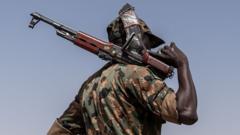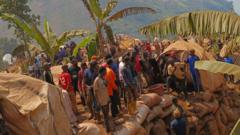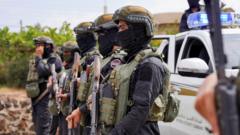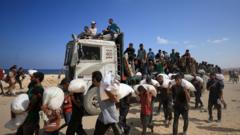The war in Sudan has escalated in the oil-rich Kordofan region, with fierce battles claimed hundreds of civilian lives. Both the army and the Rapid Support Forces (RSF) are vying for control, significantly impacting the region's and the nation’s stability. International organizations express deep concern over the humanitarian crisis arising from this intensified conflict.
Intensified Clashes Erupt in Sudan's Kordofan: The Battle for Control and Oil

Intensified Clashes Erupt in Sudan's Kordofan: The Battle for Control and Oil
As Sudan's Kordofan region becomes a key battleground in the ongoing conflict, the army and paramilitary forces clash over vital oil resources.
Sudan's Kordofan region, rich in oil resources, has emerged as a crucial front line in the fierce ongoing war between the country’s army and rival paramilitary forces, with both factions vying for dominance in a conflict that has ravaged Sudan for over two years. Recent attacks have caused the loss of hundreds of civilian lives, thrusting Kordofan into the international spotlight. “Whoever controls Kordofan effectively controls the country's oil supply, as well as a huge chunk of Sudan,” stated Amir Amin, an analyst at Oasis Policy Advisory, highlighting the strategic significance of this territory.
Moreover, Kordofan is essential for the landlocked neighbor South Sudan, as its oil exports rely on pipelines running through the region. The increasing tension in this area, home to close to eight million people, has intensified since June when the army set its sights on reclaiming territories lost to the Rapid Support Forces (RSF), which had gained significant ground earlier, even retaking the capital, Khartoum, and the vital agricultural region of Gezira.
Following the military's recapture of Khartoum in March, Gen Abdel Fattah al-Burhan, the leader of Sudan's army, made his way back to the capital three months later. However, Port Sudan remains his base as he hesitates to return permanently to a city devastated by months of fighting. The ongoing strife has resulted in an estimated 150,000 fatalities and displaced around 12 million people—equivalent to the populations of Tunisia or Belgium.
The RSF, known for their previous alliance with Burhan during a 2021 coup, turned on him due to disagreements over integrating their forces into the army. As the RSF’s ambitions in Kordofan grow, analysts caution that the army must dismantle their defenses in order to extend their reach toward Darfur, the RSF's stronghold.
Dr. Suliman Baldo from Sudan Transparency and Policy Tracker has voiced doubts about the army’s capability to overcome RSF defenses given the majority of their fighters come from local communities, particularly the Misseriya ethnic group, who are defending their homes. Airstrikes by the army on towns in West Kordofan have further alienated locals, with allegations that these operations constitute "collective punishment" against those perceived as RSF supporters.
Currently, the army maintains control over several key oil fields, but the RSF has issued threats to escalate the conflict to affect critical oil-producing areas such as Heglig in South Kordofan if the attacks do not cease. Reports from the United Nations Office for the Coordination of Humanitarian Affairs (Ocha) condemn these airstrikes which have resulted in civilian casualties, emphasizing the need for compliance with international humanitarian law.
A recent UN report highlighted alarming statistics, declaring that over 450 civilians lost their lives in recent violence, including multiple vulnerable groups. Satellite imagery analyzed by the Yale Humanitarian Research Lab indicates possible deliberate arson targeting, while rights groups report harrowing accounts of victims being burned or shot in their homes.
With fears mounting that the RSF is gearing up for a major offensive to seize el-Obeid, the capital of North Kordofan, the stakes in the battle for control over this expansive area of 390,000 square kilometers are high. Dr. Baldo noted that Umm Sumaima has shifted hands many times and serves as a pivotal defense point for the army. Control over this town could allow the RSF to strategize a siege against the military’s base in el-Obeid, while the army aims to secure supply routes to bolster its fighting forces.
The future of Sudan hangs in the balance amidst this escalating conflict, making the fate of Kordofan pivotal to both local and national stability. “Whether or not it will decide the victor of the war is open to debate, but it will undoubtedly lead to a significant shift in the ongoing conflict,” cautioned Amin.





















